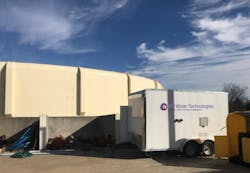Automated disinfectant residual control trailers enable control over water quality
Similar to thousands of cities throughout the United States, DeSoto, Texas purchases treated water from a nearby wholesaler, Dallas Water Utilities (DWU). DWU operates three surface water treatment plants and disinfects treated water with chloramines, which are less reactive than free chlorine and result in fewer disinfection byproducts (DBPs). Formed by reacting ammonia and chlorine, chloramines are a very effective disinfectant and typically have a high level of persistence in water systems with high water ages.
The challenge for DeSoto, like so many other consecutive systems, is managing complex water chemistry in a distribution system with over 200 miles of pipeline and millions of gallons of stored water, all while meeting increasingly stringent state and federal quality standards for drinking water. One downside of chloramines is that the disinfectant molecule can break down over time and liberate free ammonia, which can then become a food sources for nitrifying bacteria – leading to tank nitrification. The only tools available to operators at DeSoto were operational in nature: manually dosing chemicals into storage tanks in an attempt to boost residual levels; raising and lowering tank levels (a practice known as “deep cycling”); or flushing millions of gallons of water from the tanks in an effort to bring in fresher water with higher levels of residual disinfectant. Manually dosing tanks in a chloraminated system is problematic given the complex water chemistry – sometimes known as break-point chemistry. In addition to the cost of wasted water purchased from the wholesale water provider, deep cycling and flushing can leave communities vulnerable in the event of an emergency if there is insufficient water available for firefighting.
Over the years, operators at DeSoto Water Utilities focused on one particularly problematic area that experienced chronic low residual levels, a dead-end in the distribution system. Utility operators would routinely flush water, sometimes for weeks, in an attempt to restore acceptable disinfectant residual levels. The City then contracted with a local engineering consultant that was familiar with an automated residual control system operating in the neighboring City of Coppell. The Coppell solution, which had been installed more than a year earlier, utilizes a Monoclor® RCS system that combines powerful tank
mixing with continuous on-line water analysis and uses a “smart control” system that manages chemical dosing to maintain a desired residual setpoint in the water storage tank.
After observing the results from the City of Coppell system firsthand and needing to move quickly on a solution, officials from DeSoto Public Utilities rented two 20-foot mobile trailers equipped with the Monoclor® RCS residual control systems from PSI Water Technologies (PSI) in Campbell, California. The two trailers contained water quality sensors, PLC-based control centers, chemical feed skids and chemical storage tanks containing bulk sodium hypochlorite and liquid ammonium sulfate inside the trailer. Powerful PAX submersible mixers were deployed inside each water storage tank to ensure that the water inside the tanks was well-mixed and chemically homogeneous. City officials chose to lease the fully equipped trailers in order to get the residual control systems up-and-running quickly and avoid the lengthy waiting period for permitting and design. Once mobilized, the Monoclor® RCS trailers brought the water quality back into regulatory compliance, allowed for validation of system performance, and provided the necessary time for the consulting engineer to proceed with the design of a permanent installation.
In order to test the Monoclor® RCS systems in two separate pressure zones within the Desoto water distribution network, the trailers were connected directly to a 5MG ground storage tank at the Westmoreland pump station and a 3MG below-grade concrete tank at the Hampton Road pump station. By March of 2019, both systems were on-line and had delivered a quick ramp up to the desired residual setpoint of between 3.2 and 3.5 ppm. The Monoclor® RCS Water Quality Station monitored critical water quality parameters (including total chlorine, pH, ORP, and temperature) used by the proprietary algorithm contained in the Smart Controller to make dosing decisions for chlorine and ammonia feed rates as necessary to maintain the tank setpoints during normal fill/drain cycles and changing chemistry in each tank.
Once installed and operational, PSI water quality experts were able to monitor the systems remotely and offer guidance to the local operators, providing feedback as needed. After several weeks of operation and system calibration, data showed the 5MG Westmoreland Tank using approximately 70 gallons per day of hypochlorite and the 3MG Hampton Tank using approximately 30 gallons of hypochlorite per day to maintain the desired setpoints. Not surprisingly, both tanks had high levels of naturally occurring free ammonia as organic matter in the water acquired from the wholesaler decomposed. Consequently, the feed ratio for the dosing pumps was adjusted to 8:1 (chlorine to ammonia) at the Westmoreland Tank and 10:1 at the Hampton Road Tank. Traditional ratios are typically 5:1 chlorine to ammonia by weight or 1:1 molar ratios.
In the less than six months since the Monoclor® RCS systems have been in operation, DeSoto Water Utilities staff now flush less than 10% of the amount of water previously flushed. The Monoclor® RCS systems have saved operator time and valuable purchased water. In addition, water level in both tanks can now be maintained at higher levels, providing additional water on-hand in case of an emergency and returning the tanks to their intended hydraulic capacity. Most importantly, the utility was able to maintain consistent disinfectant residual levels in compliance with water quality regulations. Leasing the two trailers enabled the City to maintain compliance while working on a long-term plan to procure, permit and construct two buildings to house permanent Monoclor® RCS systems for the Westmoreland and Hampton Road tanks.
"Ever since we installed the Monoclor® RCS, I have much more confidence that we can maintain a meaningful residual throughout our distribution system.” said Allan McDonald, Manager of Utility Services, City of DeSoto.
